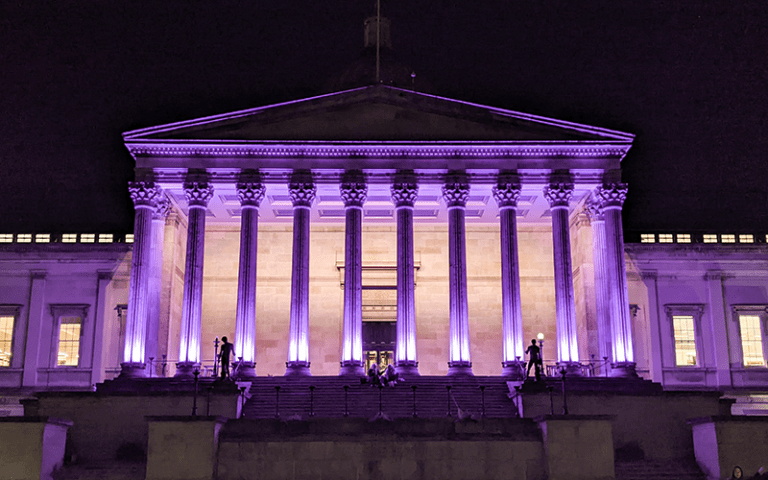Holocaust Memorial Day: why historical knowledge and conceptual understanding are key to engaging with the fragility of freedom
By Blog Editor, IOE Digital, on 25 January 2024

The stone columns of the UCL Wilkins building lit in purple to mark Holocaust Memorial Day.
25 January 2024
By Rebecca Hale
Every year, on the 27th January, people come together to mark Holocaust Memorial Day (HMD). They participate in events to remember the millions of people murdered during the Holocaust and in other genocides.
For many schools, HMD provides an important opportunity to teach students about the Holocaust, supporting them to reflect on its contemporary significance, and providing a space for young people to honour the memory of the victims. Indeed, in the UCL Centre for Holocaust Education’s most recent national study, 74.5% of teachers reported that their school marked HMD as part of their teaching about the Holocaust.
The Holocaust Memorial Day Trust (HMDT) is the charity established and funded by the UK Government to promote and support HMD in the UK. Every year, there is an annual theme for HMD, and this year’s is ‘the fragility of freedom’. In defining this theme, HMDT explain that:
“…in every genocide that has taken place, those who are targeted for persecution have had their freedom restricted and removed, before many of them are murdered. This is often a subtle, slow process. The ten stages of genocide, as identified by Professor Gregory Stanton, demonstrate that genocide never just happens. There is always a set of circumstances which occur, or which are created, to build the climate in which genocide can take place and in which perpetrator regimes can remove the freedoms of those they are targeting.”
Recognising the Holocaust as a gradual process is critical to developing a meaningful understanding of this period of history – as is understanding it as a collective process. This is because once we recognise genocide as something that unfolds, and that unfolds among the population at large, then we are better positioned to identify stages of development and, by extension, moments when intervention is possible and necessary.
As set out in the aforementioned UCL Centre for Holocaust Education report, in 2019/20, the Centre found that learning the lessons of the Holocaust to ensure that a similar human atrocity never happens again was a principal teaching aim for 39.4% of teachers. While the popularity of this aim had decreased from a decade earlier (when 56.1% of teachers selected it as a key aim), drawing on the Holocaust as a cautionary tale of where prejudice and discrimination can lead remained prevalent. Indeed, references to ‘never again’ are ubiquitous, despite several genocides occurring since the Holocaust.
The Centre’s work has illuminated this paradox, showing that Holocaust education, even within history classrooms, does not always prioritise developing historical knowledge and deeper understanding, instead focusing on the broader ‘lessons’. Thus, while students learn some historical content, it can be patchy. This is problematic, partly because it impedes understanding of genocide as a phenomenon, and partly because – as shown in our national study with students – misconceptions and knowledge gaps can come together to give inaccurate conceptions of what happened during the Holocaust, hindering one’s ability to understand it as a gradual and collective process. For instance, half of the students (50.7%) thought Hitler was solely responsible for the Holocaust. Most students also believed members of the German forces were shot if they refused to obey an order to kill Jewish people; only 5.0% correctly identified they would instead be given another duty.
To fully grasp what happened during the Holocaust and make meaningful connections with contemporary issues, students need sound historical knowledge. They also need nuanced conceptual understanding. It is only through the combination of these that students will be able to grasp and confront the broad levels of complicity across Europe that enabled genocide to happen, or comprehend the instrumental role played by pernicious ideas and beliefs such as antisemitism. This would also include understanding how the persecution of Jewish people escalated over time. The pre-war years saw Nazi anti-Jewish policy exclude German Jews from society, politics and the economy, progressing to enforced migration of Jewish people out of the Reich, followed by increasing murderous actions from September 1939, then escalating to the systematic murder of European Jewry in death camps, commencing in Chelmno towards the end of 1941.
Equipped with this sort of knowledge, students are both better able to comprehend the process of genocide and poignantly recognise and reflect on the fragility of freedom:
“I was shocked most by the fact that the hope for Never Again hasn’t been realised. We learned about Bosnia and Rwanda, and it’s still happening today. That’s really sad… but then we see antisemitism rising again too…the same old hate…and we are still scapegoating and blaming people like the refugees today too… so it’s sad to think I’ve learned this stuff in school but that many other people haven’t and we are maybe seeing the warning signs and still not stopping it….That’s shocking.” (Student, Year 9, attending a UCL Centre for Holocaust Education Beacon School).
The UCL Centre for Holocaust Education is a world-class, research-informed centre of educational excellence. It supports teachers through high quality professional development to ensure that every school student develops meaningful knowledge and understanding of the Holocaust and is able to reflect on its contemporary significance.
 Close
Close



